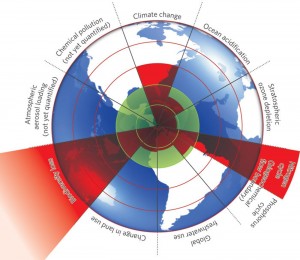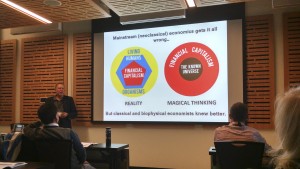Last week I had the pleasure, nay, the honor, to attend the joint Canadian and United States Ecological Economics (CANUSSEE) Conference. Its host was the University of British Columbia (UBC), Vancouver, Canada, and so it was a drive but worth every grueling second. I jest.
My company was fellow Sound Economics writer Miranda Kraus and chauffeur/Professor Lea Fortmann, and for three days I ate, drank, and sneezed economics. Scholars spanning the states and provinces flew in and paid mega sums of money to give PowerPoint spiels, violently network, and occasionally yell “Bullshit!” during each other’s talks.
With more than 70 plenaries, presentation sessions and workshops, there was plenty to do and learn, so I was pretty disappointed I could only squeeze nine in. And thanks to my volunteer status, many were pre-selected for me to attend and craft write-ups for. They wouldn’t have been my first pick, but luckily they turned out to be neat. Below are adventure highlights.
During a talk on Biophysical and Ecological Macroeconomics, both of which are subcategories of Economics that I’d never heard of, all-out war erupted. Presenter David Murphy posited that Biophysical economics had no real theoretical basis making it a unique field from ecological macroeconomics and wondered aloud whether they should just unite so they could concentrate on saving the planet. Immediately the assembly was divided into those who agreed and those who found him insane. Charles A.S. Hall was the most vocal (it just comes naturally to him) and decried “bullshit!”
As far as I can tell, both subfields consider money to be whack and consider resources and energy to be the drivers of economic growth. They pray to the Thermodynamic Laws and see GDP as so grossly inaccurate an indicator of well-being it’ll kill us all. I can’t show you this great video I took of Doctor Hall flipping out because videos aren’t permitted, but trust me, he’s a pro.
Another talk of interest was on economic growth and how silly the concept is. Neoclassicals (an economic set of thinkers that ecological economists really despise) apparently believe that perpetual economic growth is possible, even though we live in a world with finite resources. They think resources are substitutable – i.e. if we run out of trees we can use brick to build houses – and screw the environment. Ok maybe not that last part in all cases, but their models ignore environmental services and outputs like waste.
Anyway, these philosophers were pushing for steady-state economies (zero-growth) to be adopted as our policy goal, because if all economies keep hoping for 3-15% growth each year the world will be unlovingly devoured and then we die. They firmly believed in their being boundaries that, once crossed, meant degradation and someday extinction of the human environment. One speaker, Daniel O’Neill, had a wonderful presentation showing the resource targets that each nation must limit to in order to stay within our sustainable planetary boundaries, and how practically all nations are way over – or based on current trends will be way over – these limits.

Needless to say this is only a snippet of what I learned at the conference. Other honorable mentions: indigenomics – how indigenous groups’ own valuations differ from capitalism; how do we choose between adaptation and mitigation when it comes to climate change; how financial capitalism relies on stealing from the future and thus is incompatible with reality; and how payments for ecosystem services is a bad but necessary tactic.

Super thankful for the Economics Department for reaching out to me and helping me attend!
